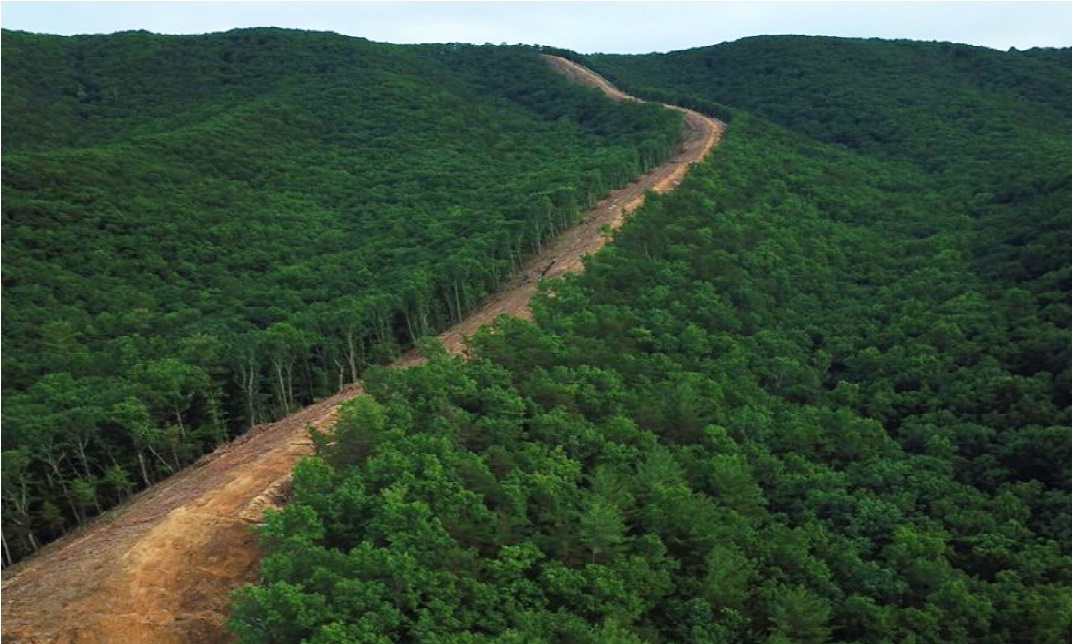RICHMOND, Va. — Conservation groups today launched a lawsuit challenging the U.S. Fish and Wildlife Service’s approval of the Mountain Valley Pipeline (MVP). The petition for review of the project was filed with the Fourth Circuit Court of Appeals in Richmond.
The Fish and Wildlife Service, which administers the Endangered Species Act, issued an opinion that allowed the pipeline to move forward — despite its serious threats to endangered species. The agency failed to accurately measure the pipeline’s impacts on endangered wildlife like the iconic Roanoke logperch and failed to set limits for how many threatened and endangered bats can be harmed or killed.
The lawsuit seeks to vacate the Service’s decision and force the agency to re-evaluate the project’s impact. The groups argue that construction on the already-foundering pipeline should stop until that process is complete.
Today, the groups also sent a letter to the agency requesting that it stay the biological opinion and incidental take statement pending court review. The species at issue include the Roanoke logperch, Indiana bat and Northern long-eared bat. The suit was filed by the Sierra Club on behalf of Wild Virginia, Appalachian Voices, Preserve Bent Mountain/BREDL, Defenders of Wildlife, Center for Biological Diversity, and Chesapeake Climate Action Network.
Additionally, MVP does not have Clean Water Act authorization to cross streams and wetlands from the Army Corps, and does not have necessary U.S. Forest Service and Bureau of Land Management authorizations.
In response, Sierra Club Staff Attorney Elly Benson released the following statement:
“The fracked gas Mountain Valley Pipeline puts several endangered species in harm’s way, while serving only to line the pockets of polluting corporations. MVP has proven it can’t build this unnecessary pipeline without devastating streams and rivers, as well as the forest habitats of Appalachia. The public should be able to trust that the U.S. Fish and Wildlife Service is making protection of endangered species its highest priority, but it fell short of that obligation here.”
David Sligh, Conservation Director for Wild Virginia stated:
“The U.S. Fish and Wildlife Service, like numerous other government agencies tasked with protecting the public and our resources, failed to do its job. Citizens cannot and will not accept actions that endanger the future of some of our rarest and most precious wildlife species. This destructive pipeline has already caused great damage to the environment and the public and it must be stopped before that damage gets worse.”
Roberta Bondurant, Preserve Bent Mountain/BREDL, said:
“Our mountain communities continue to witness MVP ravage the forest, field, stream and wetland sanctuaries of species that have supposedly been protected by federal law. We ask USFWS and the courts to do no more—and no less—than uphold that law through a critical review of the Biological Opinion. At best, the writers of that document ignored evidence of MVP construction as a threat to species survival—survival which will ultimately implicate our own.”
Anne Havemann, General Counsel for the Chesapeake Climate Action Network, stated:
“The U.S. Fish and Wildlife Service has proven its carelessness in forcing through a permit for the similarly destructive Atlantic Coast Pipeline. We have seen this same carelessness in the Service’s permit for the Mountain Valley Pipeline. This pipeline has already wreaked havoc on the landscape; it must not be allowed to continue to jeopardize the existence of our invaluable endangered species.”
Jared Margolis, Center for Biological Diversity senior attorney, said:
“This pipeline is a major threat to the Roanoke River system and the people and imperiled species that rely on it. Regulators can’t keep shrugging off the environmental harms of pipeline projects. We need to stop destroying habitats and waterways for fossil fuels that are driving the climate catastrophe.”
Jason Rylander, Senior Endangered Species Counsel for Defenders of Wildlife, said:
“The Mountain Valley Pipeline poses an enormous threat to the fish, wildlife, forests, and people in its path. The Trump administration and the U.S. Fish and Wildlife Service fast-tracked this project and failed to properly evaluate its impact on imperiled species. The Service needs to reconsider its biological opinion and further construction of this environmentally destructive project should cease before iconic species and landscapes are lost forever.”
Contact: Doug Jackson, Sierra Club, (202) 495-3045 or doug.jackson@sierraclub.org
Jared Margolis, Center for Biological Diversity, (802) 310-4054, jmargolis@biologicaldiversity.org
###


